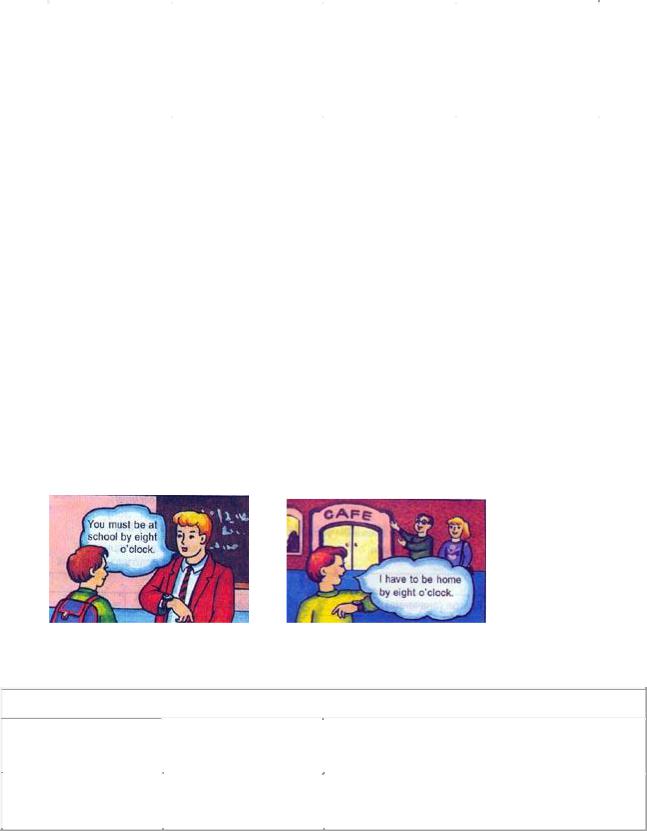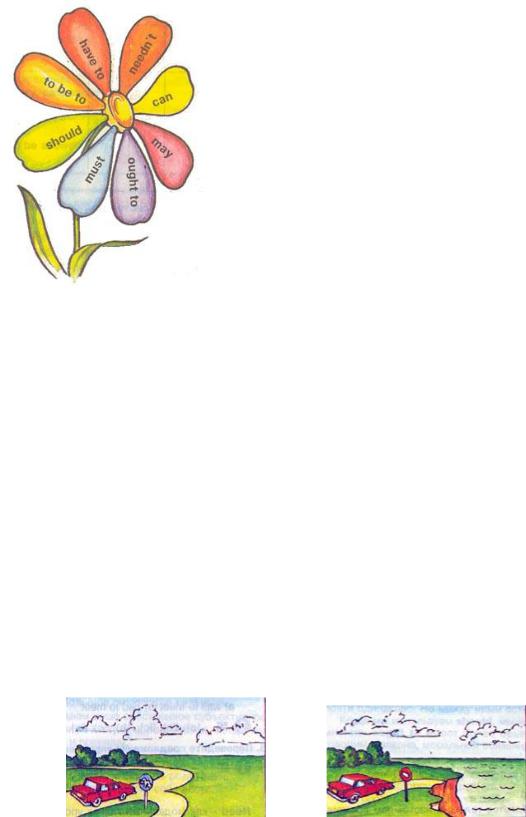
4652
.pdf
11
Глагол |
Present |
Past |
Future |
|
|
|
|
|
|
may |
may |
might |
|
|
|
|
|
|
|
to be |
am (is, are ) |
was (were) |
will (shall) |
|
allowed to |
allowed to |
allowed to |
be allowed to |
|
|
|
|
|
|
|
|
He said I |
|
You will be |
|
|
|
||
|
|
might go to |
|
|
выражае |
You may / |
|
allowed to watch |
|
here. Он сказал, |
|
|||
т допущение |
are allowed to go |
что я могу идти |
|
TV after 10. |
возможности, |
to the movies. |
туда. |
|
Вы сможете |
разрешение |
Вы можете / вам |
|
смотреть (вам |
|
совершить |
разрешено теперь |
I was allowed to |
|
разрешат) |
действие |
пойти в кино. |
go to the movies. |
|
телевизор после |
|
|
Мне разрешили |
|
10 часов. |
|
|
идти в кино. |
|
|
|
|
|
|
|
|
|
|
|
|
Модальный глагол MUST |
|
|
|
|
Мы используем must и его эквивалент have to, когда нам нужно выразить необходимость сделать что-либо. Но между ними есть разница:
Общее значение: необходимое, неизбежное или вынужденное действие.
1.глагол – must
2.конструкция - have to
Past |
Present |
Future Indefinite |
|
Indefinite |
Indefinite |
||
|
|||
|
|
|
|
had to |
have to / has |
will have to |
|
to |
|||
|
|
||
|
|
|
3. конструкция - have got to / has got to
Примеры:

12
must
You must stop smoking. - Вы должны бросить курить.
You must do your homework. - Вы должны делать домашнее задание.
You must phone home at once. - Ты должен немедленно позвонить домой.
We really must do something about the stray dogs. -
Нужно что-то делать с бродячими собаками
конструкция have to
I have to study a lot. - Мне надо много заниматься.
I had to study last night. - Мне надо было заниматься вчера вечером. / Мне пришлось заниматься вчера вечером.
I will have to study a lot this summer. - Этим летом мне придѐтся много заниматься.
Must we leave at once? - Нам что, надо немедленно выезжать?
Do I have to do this work again? - Мне что, придѐтся второй раз делать эту работу?
Did you have to work last Saturday? - Тебе что, пришлось работать в прошлую субботу?
Will you have to work next Saturday? - Тебе что, придѐтся работать в следующую субботу?
How long did you have to wait? / What time did you have to wait? - Сколько времени тебе пришлось ждать?
How many exams will you have to take? - Сколько тебе придѐтся сдавать экзаменов?
You don't have to do that! |
You mustn't do that! |
Вам (и) нет нужно этого |
Вам нельзя этого |
делать! |
делать! |

13
|
|
|
|
|
|
|
|
|
|
|
|
Глагол |
Present |
Past |
Future |
|
|
|
|
|
|
||
|
- Must I memorize |
|
|
|
|
||
this poem? |
|
must |
|
|
|
||
- Yes, you must. |
|
|
|
|
|||
|
должен обязательно |
|
|
|
|||
- Должен ли я выучить |
must |
|
|
||||
что-то сделать |
|
|
|||||
это стихотворение? |
|
|
|
||||
|
|
|
|
||||
- Да, обязательно. |
|
|
|
|
|
||
|
|
|
|
|
|
||
|
- Do we have to |
|
|
|
|
||
wait long? |
|
|
|
|
|
|
|
- Yes, you do.It's raining |
have (have |
|
|
|
|||
hard and the flaight is |
got) to |
|
|
|
|||
delayed. |
|
|
должен, приходится |
have (has) |
had to |
will (shall) |
|
- Нам придется долго |
поневоле, вынужден |
to |
|
have to |
|||
ждать? |
|
|
(в силу |
|
|
|
|
- Да. Идет сильный |
обстоятельств) |
|
|
|
|||
дождь, и рейс |
|
|
|
|
|
||
откладывается. |
|
|
|
|
|
||
|
|
|
|
|
|
||
|
- I am to meet her |
|
|
|
|
||
in |
the |
library |
today. |
be to |
|
|
|
- Я должен (мне |
|
|
|
||||
должен (я обещал, |
|
|
|
||||
предстоит, |
мы |
am (are, |
was (were) |
|
|||
договорились, |
я |
запланировал по |
is) to |
to |
|
||
расписанию, по |
|
||||||
обещал) |
встретиться с |
|
|
|
|||
ней |
в |
библиотеке |
договоренности) |
|
|
|
|
сегодня. |
|
|
|
|
|
|
|
|
|
|
|
|
|
||
|
-You should study |
|
|
|
|
||
English words before you |
|
|
|
|
|||
go |
|
to |
bed. |
should |
|
|
|
- |
Вам |
следует |
(вы |
должен (следует по |
should |
|
|
должны |
по |
моему |
моему мнению, |
|
|
||
|
|
|
|||||
мнению) |
|
учить |
совету) |
|
|
|
|
английские слова перед |
|
|
|
|
|||
сном. |
|
|
|
|
|
|
|
|
|
|
|
|
|
|
|
|
|
|
|
|
|
|
|

|
|
14 |
|
|
|
|
|
|
|
|
|
You ought to |
ought |
to |
|
|
|
return the book to me on |
следует, |
должен |
|
|
|
time. |
(это |
твой |
ought to |
|
|
Ты должен (это твой |
моральный |
долг, |
|
|
|
долг) возвратить мне |
когда мы говорим о |
|
|
|
|
книгу вовремя. |
законе, правилах) |
|
|
|
|
|
|
|
|
|
|
You needn't clean |
needn't |
|
|
|
|
the windows. They are |
|
|
|
||
нет никакой |
|
|
|
|
|
clean already. |
|
need |
|
|
|
необходимости |
|
|
|||
Тебе не нужно мыть |
|
|
|
||
(нужды) |
|
|
|
|
|
окна. Они чистые. |
|
|
|
|
|
|
|
|
|
|
|
|
|
|
|
|
|
I.Найдите модальный глагол и переведите предложения.
1.Children must not play in the street.
2.May I close the window? – Yes, you may.
3.He can play football.
4.He asked for a book and she said that he might take it.
5.I can’t go to the cinema today.
6.Can you tell me what the time?
7.Mary must be at the sports camp now.
8.She may come on Sunday.
9.He must be at home now. He always comes home at that time.
10.I could skate when I was seven.
11.Can she have done such a thing? I cannot believe it.
12.Could I have lost my book? I can’t find it.
13.He must be a good sportsman.
14.He may know the truth.
15.You must be hungry. Sit down to dinner.
16.“Susan, you must return home not later than six” – her mother said.
17.Where is Susan? – She must be late.
15
II. Ask someone if he or she can do these things?
1.Can you swim?
2.Ski
3.play chess
4.drive
5.run ten kilometers
6.ride a horse
III. Complete these sentences. Use can, can’t or couldn’t + one of these
verbs. |
|
|
|
|
|
|
come |
find |
hear |
see |
speak |
eat |
go |
|
go |
see |
sleep |
understand |
|
|
1.I’m sorry but I can’t come to your party next Saturday.
2.She spoke very quickly. I … her.
3.She got the job because she … five languages.
4.You are speaking very quietly. I … you.
5.Have you seen my bag? I … find it.
6.He … to the concert next Saturday. He’s working.
7.He … to the meeting last week. He was ill.
8.I like this hotel room. You … the mountains from the window.
9.I was tired but I …
10.His eyes are not very good. He … very well.
11.I wasn’t hungry yesterday. I … my dinner.
IV. Complete the sentences. Use must + one of these verbs.
be |
buy |
go |
go |
help |
hurry |
learn |
meet |
phone |
read |
win |
|
1.We must go to the bank today. We haven’t got any money.
2.I … I haven’t got much time.
3.She is a very interesting person. You … her.
16
4.I forgot to phone Dave last night. I … him today.
5.You … to drive. It’s very careful.
6.This is an excellent book. You … it.
7.We … some food. We’ve got nothing for dinner.
8.I … to the post office. I need some stamps.
9.I have a big problem. You … me.
10.The game tomorrow is very important for us. We …
11.You can’t always have things immediately. You … patient.
V. Rewrite the sentences using can, could, may (permission, request)
1.I’d like to talk to you for a minute, Mr Black (polite)
Could I talk to you for a minute, Mr Black?
2.I would like to use your phone (polite)
3.I would like to stop work early today ( formal)
4.I would like to speak to Jane if she’s there (polite)
5.I would like you to help me for a few minutes (polite)
6.I would like to pay you tomorrow (polite)
7.Take my laptop if you want to.
8.I’d be glad if you translate this for me ( friendly)
9.I’d be glad if you translate this for me (polite)
10.Tell me when it is time to go ( friendly)
11.I’d be grateful if you would tell me when it’s time to go (polite)
12.Start preparing the papers now.
13.I don’t mind calling you back later if you like me to.
14.I’d be glad if you would lend me 100 $.
15.I would like to ask you a question (polite)
16.I would like some tea.
17.I would like you to pass me the salt (polite)
18.Would you like me to take your coat?
19.Would you like a cup of coffee?
20.I would to have your number in case I need more information (polite)
21.I want you to repeat your question (polite)
17
VI. Put in must or had to
1.I _________ go to the bank yesterday.
2.Come on! We _________ hurry. We haven’t got much time.
3.I was nearly late for my appointment this morning. I _________to get a taxi to get there in time.
4.He didn’t know how to use the machine. I _________show him.
5.We _________ go to the bank today.
6.I _________ go. I haven’t got much time.
7.I have a problem. You _________ help me.
8.I _________phone John today.
VII. Put in mustn’t or needn’t
1.You _________ go to the bank. I can give you some money.
2.I must hurry. I _________be late.
3.I _________ forget to phone George.
4.We have a lot of time. We _________ hurry.
5.You _________buy a newspaper. You can have mine.
6.The papers are very important. You _________ lose them.
7.You _________ book a room in the hotel. I have already done it.
8.This is personal information. You _________ tell anybody.
VIII. Which do you think is better ?
1.You know I _________ take holidays
a) must |
b) should |
2.Visitors are reminded that they _________keep their bags with them
a)must b) should
3.I’m sorry, but I _________go.
a) must |
b) should |
4.I suppose you _________ try to find a new job.
a)must b) should
18
5. You _________drive more carefully. a) must b) should
6.I really _________go on a diet. I’ll start today
a) must |
b) should |
7.I’m tired. I _________ go home early |
|
a) must |
b) have to |
8. I think we _________ pay in advance |
|
a) must |
b)have to |
9.Do you really _________ wear a tie for work?
|
a) must |
b) have to |
10 |
soldier |
… obey the orders. |
|
a) must |
b) has to |
11.You _________ switch off your mobile phone on the plane. a) must b) should
12.That _________ be her daughter – they are nearly the same age.
a)can’t b) mustn’t
13.I think you _________try and relax more.
a)should b) must
14.You absolutely _________ go and see Liz.
a) should b) must
15.When I was young I _________ use a computer.
a)couldn’t b) mustn’t
Раздел 2. Новости. Поиск профессиональной информации в интернете.
I. Повторите времена английского глагола. Приведите примеры, используя выученную лексику (см. Киселева Ю.Ю., Милованова И.В.
Методический указания для практических занятий).
В английском сложноподчиненном предложении с придаточным дополнительным (вопрос «что?», «кто?», «чего?» и т.д.) соблюдаются правила согласования времен в главном и придаточном предложениях. Эти правила сводятся к следующему:
19
1.Если глагол-сказуемое главного предложения стоит в настоящем или будущем времени, то глагол-сказуемое придаточного дополнительного предложения может стоять в любой временной форме, требуемой смыслом, например:
Не says you are right. Он говорит, что ты прав. Не will tell why he was not at school yesterday. Он скажет, почему он не был в школе вчера.
2.Если глагол-сказуемое главного предложения стоит в прошедшем времени (обычно Past Indefinite), то и глагол дополнительного придаточного предложения должен стоять в одном из прошедших времен:
He said he went to institute every day. Он сказал, что ходит в институт каждый день. Не told me he was preparing for his exam. Он сказал мне, что готовится к экзамену. I didn't know he had left for Moscow. Я не знал, что он уехал в Москву. Не told me that he would meet me at the college. Он сказал мне,
что встретит меня в колледже.
Прямая речь может быть либо передана так, как она была произнесена, либо описана с помощью сложноподчиненного предложения (косвенная речь):
прямая речь |
косвенная речь |
Не says, «We'll have to take a taxi». |
He says (that) we'll have to take a |
taxi.
Прямая речь вводится словами ... say/says/said, за которыми ставится запятая, и берется в кавычки. В косвенной речи запятая, как правило, не ставится и союз that часто не употребляется.
Условные предложения делятся на предложения реального условия и предложения нереального условия. Употребление глагольных форм в этих предложениях зависит от степени реальности и времени действия, выраженного глаголом.
В придаточных предложениях реального условия и времени, действие которых отнесено к будущему с союзами: if (если), when (когда), after (после), before (перед тем, как), as soon as (как только), unless (если не), until (до тех пор, пока не) будущее время заменяется формой настоящего времени, но на русский язык переводится будущим. Например:
If you help me, I shall do this work in time. Если ты поможешь мне, я выполню эту работу вовремя. As soon as I am free, I shall come to you. Как
20
только я освобожусь, я навещу тебя. We shall not begin until you come. Мы не начнем, пока ты не придешь.
1. Choose the correct verb form from those in brackets.
1)I (phone / will phone) you when I (come / will come) back.
2)When the Sales Manager (arrives / will arrive) tell him I (am / will be) back at 5 o'clock.
3)If I ( pass / will pass) my exams, I (enter / will enter) the University.
4)If there (is / will be) a good program on TV, I (watch / will watch) it.
5)I (tell / will tell) him the news when I (see / will see) him.
6)If it (rains / will rain), I (stay / will stay) at home.
7)I (try / will try) to speak to the Managing Director before he (leaves / will leave) for New York.
8)I (buy / will buy) a car when I (save / will save) enough money.
9)If you (insist / will insist), I (accept / will accept) the invitation.
10)What (do / will) you do if you (miss / will miss) the train?
11)I (pay / will pay) for the coffee if you (don't / won't) mind.
12)In case you (arrive / will arrive) earlier, wait for me at the station.
2. Choose the correct verb form from those in brackets.
1) If you (are not able / will not be able) to do this yourself, I (help / will help)
you.
2)I (go / will go) to stay with my grandparents as soon as the exams (are over / will be over).
3)Can you look after my cat while I (am / will be) away?
4)If it (isn't /won't be) too expensive, I (buy / will buy) it.
5)You (fail / will fail) your exam if you (don't / won't) study hard.
6)Where (do / will) you stay when you (arrive / will arrive) in Paris?
7)As soon as I (get / will get) tickets 1 (phone / will phone) you.
8)The flowers (don't / won't) grow well if you (don't / won't) look after them
properly.
9)I (don't / won't) go to bed until I (finish / will finish) writing the paper.
